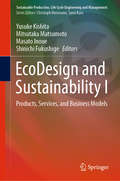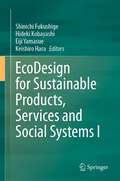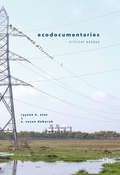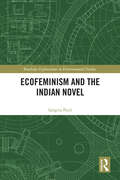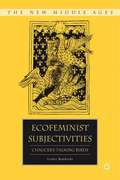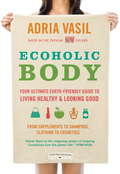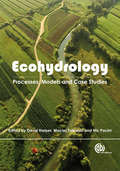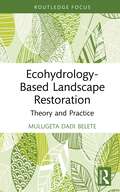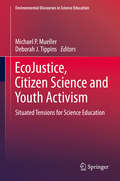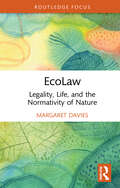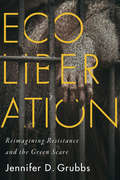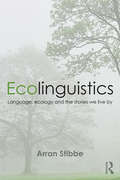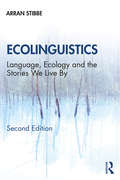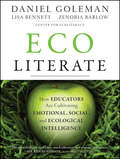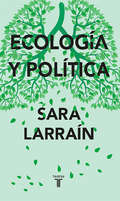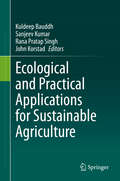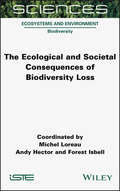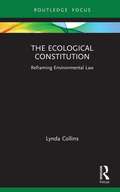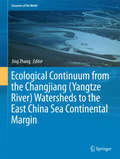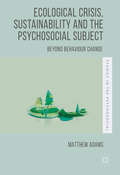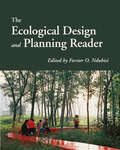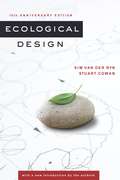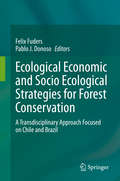- Table View
- List View
EcoDesign and Sustainability I: Products, Services, and Business Models (Sustainable Production, Life Cycle Engineering and Management)
by Yusuke Kishita Mitsutaka Matsumoto Masato Inoue Shinichi FukushigeThis book highlights cutting-edge ecodesign research, covering product and service design, smart manufacturing, and social perspectives in ecodesign. Featuring selected papers presented at EcoDesign 2019: 11th International Symposium on Environmentally Conscious Design and Inverse Manufacturing, it also includes diverse, interdisciplinary approaches to foster ecodesign research and activities. In the context of Sustainable Development Goals (SDGs), it addresses the need for the manufacturing industry to design innovations for sustainable value creation, taking into account technological developments, legislation, and consumer lifestyles. Further, the book discusses the concept of circular economy, which originated in Europe and aims to increase resource efficiency by shifting away from the linear economy. Focusing on product life cycle design and management, smart manufacturing, circular economy, and business strategies, and providing useful approaches and solutions to these emerging concepts, this book is intended for both researchers and practitioners working in the broad field of ecodesign and sustainability.
EcoDesign for Sustainable Products, Services and Social Systems I
by Shinichi Fukushige Hideki Kobayashi Eiji Yamasue Keishiro HaraThis 2-volume book highlights cutting-edge ecodesign research and covers broad areas ranging from individual product and service design to social system design. It includes business and policy design, circular production, life cycle design and management, digitalization for sustainable manufacturing, user behavior and health, ecodesign of social infrastructure, sustainability education, sustainability indicators, and energy system design. Featuring selected papers presented at EcoDesign 2021: 12th International Symposium on Environmentally Conscious Design and Inverse Manufacturing, it also includes diverse, interdisciplinary approaches to foster ecodesign research and activities. In the context of Sustainable Development Goals (SDGs), in particular SDG 12 (Responsible Consumption and Production), it addresses design innovations for sustainable value creation, considering technological developments, legislation, and consumer lifestyles. Further, the book discusses the concept of circular economy, which aims to develop circular business models for resource efficient society by taking advantage of digital technologies including artificial intelligence, internet of things, digital twin, data analysis and simulation. Written by experts from academia and industry, Volume 1 highlights sustainable design such as product and process design, collaborative design, sustainable innovation, digital technologies, design methodology for sustainability, and energy system design. The methods, tools, and practices described are useful for readers to facilitate value creation for sustainability.
Ecodocumentaries
by Rayson K. Alex S. Susan DeborahThis book features ten critical essays on ecodocumentaries written by eminent scholars from India, USA, Ireland, Finland and Turkey in the area of ecocinema studies. Situating social documentaries with explicit ecological form and content, the volume takes relational positions on political, cultural and conservational aspects of natures and cultures in various cultural contexts. Documentaries themed around issues such as electronic waste, animal rights, land ethics, pollution of river, land grabbing, development and exotic plants are some of the topics ecocritiqued in this volume.
Ecofeminism and the Indian Novel (Routledge Explorations in Environmental Studies)
by Sangita PatilEcofeminism and the Indian Novel tests the theories of ecofeminism against the background of India’s often different perceptions of environmental problems, challenging the hegemony of Western culture in thinking about human problems. This book moves beyond a simple application of the concepts of ecofeminism, instead explaining the uniqueness of Indian novels as narratives of ecofeminism and how they can contribute to the development of the theory of ecofeminism. In examining a selection of novels, the author argues that Indian texts conceptualize the ecological crisis more as a human problem than as a gender problem. The book proposes that we should think of ecofeminism as ecohumanism instead, seeing human beings and nature as a part of a complex web. Novels analysed within the text include Kamala Markandaya’s Nectar in a Sieve (1954), Shivram Karanth’s Return to Earth (2002) and Na D’Souza’s Dweepa (2013). Ecofeminism and the Indian Novel will be of great interest to students and scholars of ecofeminism, ecocriticism, ecological feminism, environmental humanities, gender studies, ecological humanities, feminist studies and Indian literature.
Ecofeminist Approaches to Early Modernity
by Jennifer Munroe Rebecca LarocheChallenges the notion of how early modern women may or may not have spoken for (or even with) nature. By focusing on various forms of 'dialogue,' these essays shift our interest away from speaking and toward listening, to illuminate ways that early modern Englishwomen interacted with their natural surroundings.
Ecofeminist Subjectivities
by Lesley KordeckiThis bookanalyzes theinteraction between gender and species in Chaucer's poetry and strives to understand his adaptation of medieval discourse through an ecofeminist lens. Works that either speak of animals, or more pertinently those with animals speaking, offer fruitful results in the attempt to understand the medieval textual handling of the 'others' of society. "
Ecoholic Body: Your Ultimate Earth-friendly Guide to Living Healthy and Looking Good
by Adria VasilAdria Vasil, Canada's straight-shooting green living expert, is back, and this time it's personal . . . care, that is. Her latest eco bible delivers the lowdown on virtually every product that comes into contact with our bodies. From the pollutants clogging your sinus meds all the way to the outlaw toxins leaching from your sandals, ECOHOLIC BODY has you covered, head to toe. Never shy to blow the whistle, Adria calls out supplement and shampoo makers that exaggerate their green cred. This witty, indispensable guide will arm you with the knowledge you need to keep you and your family healthy, happy and green, all while detoxing the planet. Look your best- "Mean 15" ingredients to avoid- Skin care reviews for moisturizers, sunscreen, anti-aging and acne- Fresh ways to fight funk from bad breath to B.O.- Toxin-free hair care that works- The lowdown on mineral makeup, natural cosmetics, tattoos and more Feel your best- Nature's best remedies and superfoods that are good for the planet and your body- Greening your health care- Pollution-triggered health problems- Ecoholic weight loss plan- Greener birth control, local sex toys and more Dress your best- All the latest eco fashions, including activewear, maternity clothes, lingerie, menswear, footwear, jewellery, wedding dresses and more Give your kids nature's best- Toxin-free bum balms, shampoos, bubble bath, oils and powders- Green diaper reviews- The scoop on kids' PJs, clothes, charms And more- Exhaustive testing guides for everything from natural deodorant to herbal shampoos- Made-in-Canada products and services- Coast-to-coast store directory- DIY recipes for homemade body care- Money-saving tips in every chapterose hands touched? She rehearsed the questions she wondered if she would ever be able to ask. Why do you do it? Is it necessary to your poetry? Why did you choose this job? Or did it choose you?-- from The Murder RoomFrom the Hardcover edition.
Ecohydrology: An Approach to the Sustainable Management of Water Resources
by Maciej Zalewski Nic Pacini David HarperEcohydrology is an emerging new sub-discipline which links elements of ecology with hydrology at all points in the water cycle, ranging in scale from water-plant physiological relationships to whole catchment water-ecosystem processes. This book pays most attention to the larger scales of ecohydrology, emphasizing the use of this tool in striving towards the goal of sustainable water management. Authors from Eastern and Western Europe, America, Australia and South Africa give a broad global context.
Ecohydrology-Based Landscape Restoration: Theory and Practice (Routledge Focus on Environment and Sustainability)
by Mulugeta Dadi BeleteThis book provides an introduction to a fairly new approach to natural resources management practice entitled ecohydrology-based landscape restoration. Ecohydrology-based landscape restoration integrates landscape restoration practices with ecohydrology science and principles in order to help address the limitations of current management practices in developing countries. Focusing on both the theory and practice of implementing new management practices, the book includes conceptual designs and practical demonstrations for a variety of sites, including hillsides, farmlands, gullies, riparian buffers and wetlands, while also drawing on field research conducted in Ethiopia. The book puts forward principles for improving current practices, which include the better integration of hydrological and ecological concerns, the greater involvement of local communities, the adoption of indigenous practices, the establishment of green and semi-grey infrastructure as an ecohydrological systemic solution and the necessity of taking an adaptive approach to managing landscapes. This book will be of great interest to students and scholars of water resource management, ecohydrology and landscape restoration as well as professionals involved in the restoration of landscapes in developing countries.
EcoJustice, Citizen Science and Youth Activism
by Michael P. Mueller Deborah J. TippinsThis volume draws on the ecojustice, citizen science and youth activism literature base in science education and applies the ideas to situated tensions as they are either analyzed theoretically or praxiologically within science education pedagogy. It uses ecojustice to evaluate the holistic connections between cultural and natural systems, environmentalism, sustainability and Earth-friendly marketing trends, and introduces citizen science and youth activism as two of the pedagogical ways ecojustice philosophy can be enacted. It also comprises evidence-based practice with international service, community embedded curriculum, teacher preparation, citizen monitoring and community activism, student-scientist partnerships, socioscientific issues, and new avenues for educational research.
EcoLaw: Legality, Life, and the Normativity of Nature
by Margaret DaviesThis book re-imagines law as ecolaw. The key insight of ecological thinking, that everything is connected to everything else – at least on the earth, and possibly in the cosmos – has become a truism of contemporary theory. Taking this insight as a starting point for understanding law involves suspending theoretical certainties and boundaries. It involves suspending theory itself as a conceptual project and practicing it as an embodied and material project. Although an ecological imagining of law can be metaphorical, and can be highly imaginative and suggestive, this book shows that it is also literal. Law is part of the material ‘everything’ that is connected to everything else. This means that once the previous certainties of legal thinking have been dismantled, it is after all possible to think of law as ‘natural’ – as embedded in and emergent from a normative biophysical nature. The book proposes that there exists a natural nomos: animals, plants, and Earth systems that produce their own values and norms from which human norms and laws emerge. This book, then, proposes a new way to understand law, and pursues specific arguments to demonstrate the feasibility of law as ecolaw. Drawing inspiration from current trends in the post-humanities, socioecological thought, and developments across the natural sciences in their specific intersections with humanities and social science disciplines, this book will appeal both to legal theorists and to others with interests in these areas.
Ecoliberation: Reimagining Resistance and the Green Scare (Outspoken)
by Jennifer D. GrubbsDisenchanted by indirect forms of protest designed to work within existing systems of corporate and state power, animal and earth liberation activists have turned instead to direct action. In this detailed ethnographic account Jennifer Grubbs takes the reader inside the complicated, intricate world of these powerful and controversial interventions, nuancing the harrowing realities of political repression with the inspiring, clever ways that activists resist.Grubbs draws on her personal experiences within the movement to offer a thoughtful and intersectional analysis. Tracing the strategies of liberationist activists as they grapple with doing activism under extreme repression, Ecoliberation challenges ubiquitous frameworks that position protestors as either good or bad by showing how activists playfully and confrontationally enact radical social change. Nearly a decade in the making, the book looks back at the notorious period of repression called the Green Scare and draws contemporary connections to the creep of fascism under President Donald Trump.In stories that are simultaneously heartbreaking, riddled with tension and contradiction, and inspiring, Grubbs proves that whether or not the revolution is televised, it will be spectacular.
Ecolinguistics: Language, Ecology and the Stories We Live By
by Arran StibbeThe increasingly rapid destruction of the ecological systems that support life is calling into question some of the fundamental stories that we live by: stories of unlimited economic growth, of consumerism, progress, individualism, success, and the human domination of nature. Ecolinguistics shows how linguistic analysis can help reveal the stories we live by, open them up to question, and contribute to the search for new stories. Bringing together the latest ecolinguistic studies with new theoretical insights and practical analyses, this book charts a new course for ecolinguistics as an engaged form of critical enquiry. Featuring: A framework for understanding the theory of ecolinguistics and applying it practically in real life; Exploration of diverse topics from consumerism in lifestyle magazines to Japanese nature haiku; A comprehensive glossary giving concise descriptions of the linguistic terms used in the book; Discourse analysis of a wide range of texts including newspapers, magazines, advertisements, films, nonfiction books, and visual images. This is essential reading for undergraduates, postgraduates and researchers working in the areas of Discourse Analysis and Language and Ecology.
Ecolinguistics: Language, Ecology and the Stories We Live By (Bloomsbury Advances In Ecolinguistics Ser.)
by Arran StibbeEcolinguistics: Language, Ecology and the Stories We Live By is a ground-breaking book which reveals the stories that underpin unequal and unsustainable societies and searches for inspirational forms of language that can help rebuild a kinder, more ecological world. This new edition has been updated and expanded to bring together the latest ecolinguistic studies with new theoretical insights and practical analyses. The book presents a theoretical framework and practical tools for analysing the key texts which shape the society we live in. The theory is illustrated through examples, including the representation of environmental refugees in the media; the construction of the selfish consumer in economics textbooks; the parallels between climate change denial and coronavirus denial; the erasure of nature in the Sustainable Development Goals; creation myths and how they orient people towards the natural world; and inspirational forms of language in nature writing, Japanese haiku and Native American writing. This edition provides an updated theoretical framework, new example analyses, and an additional chapter on narratives. Accompanied by a free online course with videos, PowerPoints, notes and exercises (www.storiesweliveby.org.uk), as well as a comprehensive glossary, this is essential reading for undergraduates, postgraduates and researchers working in the areas of Discourse Analysis, Environmental Studies and Communication Studies.
Ecoliterate: How Educators Are Cultivating Emotional, Social, and Ecological Intelligence
by Daniel Goleman Lisa Bennett Zenobia BarlowA new integration of Goleman's emotional, social, and ecological intelligence Hopeful, eloquent, and bold, Ecoliterate offers inspiring stories, practical guidance, and an exciting new model of education that builds - in vitally important ways - on the success of social and emotional learning by addressing today's most important ecological issues. This book shares stories of pioneering educators, students, and activists engaged in issues related to food, water, oil, and coal in communities from the mountains of Appalachia to a small village in the Arctic; the deserts of New Mexico to the coast of New Orleans; and the streets of Oakland, California to the hills of South Carolina. Ecoliterate marks a rich collaboration between Daniel Goleman and the Center for Ecoliteracy, an organization best known for its pioneering work with school gardens, school lunches, and integrating ecological principles and sustainability into school curricula. For nearly twenty years the Center has worked with schools and organizations in more than 400 communities across the United States and numerous other countries. Ecoliterate also presents five core practices of emotionally and socially engaged ecoliteracy and a professional development guide.
Ecología y política
by Sara LarraínUna breve y útil exposición de la historia y las principales corrientes ecologistas, desde Platón a nuestros días El cambio climático ha sido generado por nuestra forma de habitar la Tierra: por nuestros patrones de producción y consumo basados en combustibles fósiles —carbón, petróleo y gas—, por la doctrina económica dominante y globalizada —sobre todo por sus modelos de negocios—, y por el extractivismo desatado sobre todos los recursos naturales y ecosistemas del planeta. La emergencia climática, cuya más drástica amenaza es el calentamiento global y el fin de las aguas y los bosques como hoy los conocemos, ya está afectando gravemente a todos los pueblos y comunidades que dependen en forma directa de la naturaleza y se aproxima a devastar las formas de vida urbanas. Ante este escenario, la destacada ambientalista chilena Sara Larraín, discípula de Gastón Soublette, quien durante décadas se ha dedicado a enseñar los fundamentos filosóficos del pensamiento ecologista, ofrece un conciso y fundamental ensayo de divulgación filosófica. La actualidad del problema, ante el catastrófico escenario global, supone una oportunidad única para aquellos que, alarmados ante el cambio climático, desean introducirse con urgencia en las raíces del pensamiento medioambiental.
Ecological and Practical Applications for Sustainable Agriculture
by Kuldeep Bauddh Sanjeev Kumar Rana Pratap Singh John KorstadRampant industrialization, urbanization, and population growth have resulted in increased global environmental contamination. The productivity of agricultural soil is drastically deteriorated and requires a high dose of fertilizers to cultivate crops. To ensure food security, farmers are compelled to apply excess chemical fertilizers and insecticides that contaminate soil, air, and water. Heavy loads of chemical fertilizers not only degrade the quality of agricultural land but also pollute water and air. Use of chemical fertilizers also accelerate the release of greenhouse gases like nitrous oxide and methane along with nutrient runoff from the watershed in to lower elevation rivers and lakes, resulting in cultural eutrophication.Farming practices globally in developed, developing, and under-developing countries should utilize and promote sustainable methods through viable combined environmental, social, and economic means that improve rather than harm future generations. This can include use of non-synthetic fertilizers like compost, vermicompost, slow-release fertilizers, farmyard manures, crop rotations that include nitrogen-fixing legumes. Organic fertilizers like compost and vermicompost improve soil properties like texture, porosity, water-holding capacity, organic matter, as well as nutrient availability. The purpose of this book is to document the available alternatives of synthetic fertilizers, their mode of action, efficiency, preparation methodology, practical suggestions for sustainable practices, and needed research focus. The book will cover major disciplines like plant science, environmental science, agricultural science, agricultural biotechnology and microbiology, horticulture, soil science, atmospheric science, agro-forestry, agronomy, and ecology. This book is helpful for farmers, scientists, industrialists, research scholars, masters and graduate students, non-governmental organizations, financial advisers, and policy makers.
The Ecological and Societal Consequences of Biodiversity Loss
by Michel Loreau Andy Hector Forest IsbellThe idea that changes in biodiversity can impact how ecosystems function has, over the last quarter century, gone from being a controversial notion to an accepted part of science and policy. As the field matures, it is high time to review progress, explore the links between this new research area and fundamental ecological concepts, and look ahead to the implementation of this knowledge.This book is designed to both provide an up-to-date overview of research in the area and to serve as a useful textbook for those studying the relationship between biodiversity and the functioning, stability and services of ecosystems. The Ecological and Societal Consequences of Biodiversity Loss is aimed at a wide audience of upper undergraduate students, postgraduate students, and academic and research staff.
Ecological Climatology
by Gordon BonanThe third edition of Gordon Bonan's comprehensive textbook introduces an interdisciplinary framework to understand the interaction between terrestrial ecosystems and climate change. Ideal for advanced undergraduate and graduate students studying ecology, environmental science, atmospheric science, and geography, it reviews basic meteorological, hydrological, and ecological concepts to examine the physical, chemical, and biological processes by which terrestrial ecosystems affect and are affected by climate. This new edition has been thoroughly updated with new science and references. The scope has been expanded beyond its initial focus on energy, water, and carbon to include reactive gases and aerosols in the atmosphere. The new edition emphasizes the Earth as a system, recognizing interconnections among the planet's physical, chemical, biological, and socioeconomic components, and emphasizing global environmental sustainability. Each chapter contains chapter summaries and review questions, and with over 400 illustrations, including many in color, this textbook will once again be an essential student guide.
The Ecological Constitution: Reframing Environmental Law (Routledge Focus on Environment and Sustainability)
by Lynda CollinsThe Ecological Constitution integrates the insights of environmental constitutionalism and ecological law in a concise, engaging and accessible manner. This book sets out the necessary components of any constitution that could be considered "ecological" in nature. In particular, it argues that an ecological constitution is one that codifies the following key principles, at a minimum: the principle of sustainability; intergenerational equity and the public trust doctrine; environmental human rights; rights of nature; the precautionary principle and non-regression; and rights and obligations relating to a healthy climate. In the context of the global environmental crisis that characterises the current Anthropocene era, these principles are important tools for changing consciousness and driving pragmatic policy reforms around the world. Re-imagining constitutions along these lines could play a vital role in the collective project of building a sustainable future for humans, animals, ecosystems and the biosphere we all share. This book will be of great interest to students and scholars of environmental law, ecological law, environmental constitutionalism, sustainability and rights of nature.
Ecological Continuum from the Changjiang (Yangtze River) Watersheds to the East China Sea Continental Margin
by Jing ZhangThe book provides a cross-disciplinary and multi-scale assessment of a world top river, the Changjiang (Yangtze River) and its adjacent marginal environment, the East China Sea. The studies in this volume bridges the watersheds of the river and the marginal sea through a combined approach of hydro-dynamics, geochemistry, sedimentary processes, ecology and fishery. The response of ecosystem to the external driving forces is examined via process-oriented observations, mesocosm experiments and numerical simulations in combination. The lessons learnt from the case studies of Changjiang and East China Sea can be beneficial to those who are doing inter-disciplinary researches in the continuum from watersheds to continental margins.
Ecological Crisis, Sustainability and the Psychosocial Subject
by Matthew AdamsThis book draws on recent developments across a range of perspectives including psychoanalysis, narrative studies, social practice theory, posthumanism and trans-species psychology, to establish a radical psychosocial alternative to mainstream understanding of 'environmental problems'. Only by addressing the psychological and social structures maintaining unsustainable societies might we glimpse the possibility of genuinely sustainable future. The challenges posed by the reality of human-caused 'environmental problems' are unprecedented. Understanding how we respond to knowledge of these problems is vital if we are to have a hope of meeting this challenge. Psychology and the social sciences have been drafted in to further this understanding, and inform interventions encouraging sustainable behaviour. However, to date, much of psychology has appeared happy to tinker with individual behaviour change, or encourage minor modifications in the social environment aimed at 'nudging' individual behaviour. As the ecological crisis deepens, it is increasingly recognised that mainstream understandings and interventions are inadequate to the collective threat posed by climate change and related ecological crises.
The Ecological Design and Planning Reader
by Forster O. NdubisiFrom Henry David Thoreau to Rachel Carson, writers have long examined the effects of industrialization and its potential to permanently alter the world around them. Today, as we experience rapid global urbanization, pressures on the natural environment to accommodate our daily needs for food, work, shelter, and recreation are greatly intensified. Concerted efforts to balance human use with ecological concerns are needed now more than ever. A rich body of literature on the effect of human actions on the natural environment provides a window into what we now refer to as ecological design and planning. The study and practice of ecological design and planning provide a promising way to manage change in the landscape so that human actions are more in tune with natural processes. In The Ecological Design and Planning Reader Professor Ndubisi offers refreshing insights into key themes that shape the theory and practice of ecological design and planning. He has assembled, synthesized, and framed selected seminal published scholarly works in the field from the past one hundred and fifty years----ranging from Ebenezer Howard's Garden Cities of To-morrow to Anne Whiston Spirn's, "Ecological Urbanism: A Framework for the Design of Resilient Cities. " The reader ends with a hopeful look forward, which suggests an agenda for future research and analysis in ecological design and planning. This is the first volume to bring together classic and contemporary writings on the history, evolution, theory, methods, and exemplary practice of ecological design and planning. The collection provides students, scholars, researchers, and practitioners with a solid foundation for understanding the relationship between human systems and our natural environment.
Ecological Design, Tenth Anniversary Edition: An Ecological Design Retrospective
by Sim Van der Ryn Stuart CowanEcological Design is a landmark volume that helped usher in an exciting new era in green design and sustainability planning. Since its initial publication in 1996, the book has been critically important in sparking dialogue and triggering collaboration across spatial scales and design professions in pursuit of buildings, products, and landscapes with radically decreased environmental impacts. This 10th anniversary edition makes the work available to a new generation of practitioners and thinkers concerned with moving our society onto a more sustainable path. Using examples from architecture, industrial ecology, sustainable agriculture, ecological wastewater treatment, and many other fields, Ecological Design provides a framework for integrating human design with living systems. Drawing on complex systems, ecology, and early examples of green building and design, the book challenges us to go further, creating buildings, infrastructures, and landscapes that are truly restorative rather than merely diminishing the rate at which things are getting worse.
Ecological Economic and Socio Ecological Strategies for Forest Conservation: A Transdisciplinary Approach Focused on Chile and Brazil
by Felix Fuders Pablo J. DonosoThis book proposes strategies for improving the resilience and conservation of temperate forests in South America, such that these forests can provide ecosystem services in a sustainable way. As such it contributes to the design of a resilient human-forest model that takes into account the multiculturalism of local communities, in many cases including aspects of ecological economics, development economics and territorial development planning that are related to indigenous peoples or first nations. Further, it provides proposals for public and territorial policies that improve the state of conservation of native forests and forest ecosystems, based on a critical analysis of the economic factors that lead to the degradation of forest ecosystems in South America today. This edition was conceived by members of the Transdisciplinary Research Center for Social and Ecological Strategies for Sustainable Forest Management in South America at the Universidad Austral de Chile. It includes contributions by distinguished researchers from around the world, combining the fields of economics, ecology, biology, anthropology, sociology and statistics. It is not, however, simply a collection of works written by authors from different disciplines, but rather each chapter is in itself transdisciplinary. This approach makes the book a unique contribution to enhancing social, managerial and political approaches to forestry management, helping to protect forest ecosystem services and make them more sustainable. This, in turn, will benefit local communities and society as a whole, by reducing the negative externalities of forestry management and enhancing future opportunities.
